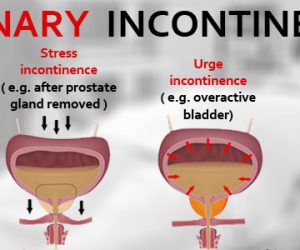Urinary Incontinence

What is Urinary Incontinence? symptoms, effects & its treatment:
Urinary incontinence which means involuntary leakage of urine, is a common problem in many Male and Female individuals. This is a common and distressing problem, which may have a large impact on quality of life and will be socially bothering issue if neglected. The severity ranges from occasionally leaking urine when you cough or sneeze to having an urge to urinate that’s so sudden and strong you don’t get to a toilet in time
Types of urinary incontinence:
There are 3 main types of urinary incontinence.
- Stress incontinence:seen whenever the bladder pressure increases due to weakened pelvic floor muscles
- Urge incontinence:seen in elderly population, nerve and muscle damage. In this there will be sudden urge to urinate
- Mixed incontinence:combination of both stress and urge incontinence features
In the olden days due to poor awareness of physiotherapy many used to neglect the problem. Now there are so many recent advances in the treatment of urinary incontinence both in exercise therapy and electrotherapy
In exercise therapy we go for :
- Pelvic floor strengthening exercises also known as Kegels exercises. Kegels exercises should be properly done else can further aggravate the problem. Most of them think that holding urine and practicing can solve the problem. The statement is partly correct. As holding urine when the bladder is in the stretched position can further aggravate the prob. Hence, the proper identification of vaginal muscles, isolating abdominal and gluteal muscles should be practiced under guidance. This can be continued as a home programme. For the identification and management a physiotherapist can guide you and make you practice the exercises
- Core strengthening exercises: these exercises strengthen your core muscles (upper and lower, transverse abdominals and back muscles)
In electrotherapy we have biofeedback with or without stimulations for pelvic floor muscles. The treatment alters for the different types of incontinence.
Please visit a Women’s Health Physiotherapist for more information
Check out these links for relevant information: Women’s health, Ante–natal post-natal
For more details contact us on 📞9618906780
